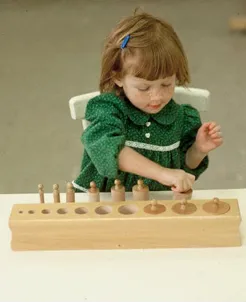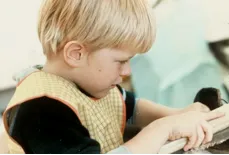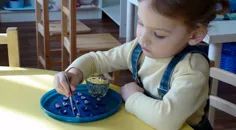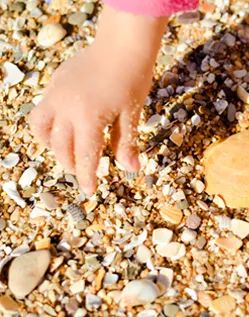Sensitive Periods in Development
The sensitive periods comprise one of several basic principles on which Montessori early childhood education is founded. We begin with an image of a little girl, not yet four, in a Montessori classroom. She is doing an activity called the cylinder block. It was a little girl much like this little girl who first opened the eyes of Dr. Maria Montessori to the possibility of sustained concentration in young children. The child Montessori was watching took all the cylinders out and replaced them more than forty times. I have observed the same process on numerous occasions.

No one had asked her to do it, let alone told her it was something she had to do. Of her own volition, she started to repeat and repeat and repeat. When she was finally finished, she looked up as if she felt refreshed from a long nap. Why?
 It soon became evident that this was not an unusual occurrence. Long periods of repetition began to be common events in Montessori classrooms and homes all over the world. Children would repeat an action until something inside them was no longer interested and they moved on to other materials. Sometimes the repetition occurred in one day; sometimes it lasted several days or several weeks. In some cases, the interest lasted for months.
It soon became evident that this was not an unusual occurrence. Long periods of repetition began to be common events in Montessori classrooms and homes all over the world. Children would repeat an action until something inside them was no longer interested and they moved on to other materials. Sometimes the repetition occurred in one day; sometimes it lasted several days or several weeks. In some cases, the interest lasted for months.

Montessori wrote about these intense interests as sensitive periods. We might say that the sensitive periods furnish energy for the child to explore specific areas of the environment and to master certain skills at precise time periods. Montessori said: “It is this sensibility which enables a child to come into contact with the external world in a particularly intense manner. At such a time everything is easy; all is life and enthusiasm. Every effort marks an increase in power.”

When you observe little children, you see that they are attracted to certain objects and activities and not to others. During this period of intense interest, whether in the cylinder block or polishing a shoe, writing a word, or learning to polish a leaf, you see the total engagement of the child’s attention.
The children are calm and centered. They are developing coordination, concentration, independence, and whatever specific skill the material offers. They are paying no attention to the other twenty children in the classroom and have chosen to do this work. They are self-disciplined.

In sensitive periods, the brain has given a signal that it is time to accomplish some specific developmental task. The child seeks and hopefully finds something in the environment that gives him the opportunity to exercise that newly developing skill. The child then chooses to work at it until the skill is firmly in place, then loses interest, and moves on to the next sensitive period.
Tantrums
Do your children ever have seemingly inexplicable tantrums? I know mine did! Sometimes they were tired, sometimes they were being ornery, and sometimes I was interrupting something that the child really needed to do. The sensitive periods are powerful and if we block them, even without realizing it, we can cause a repression of the child’s energy.
Consider little three-year-old Susanna. Her daddy is working at his desk. She climbs up in his lap and pours out his paperclips all over the desk. Daddy’s first impulse is to stop her from making a mess. Then he just watches. She picks the paperclips up one by one and puts them back. Then she dumps them out and does it again, and again and again. What is happening?
She is in a sensitive period for mastering what we call the pincer grip, the grip of thumb, first finger and middle finger that she will soon use when she is ready to write. This is, in fact, one of the ways she gets ready to write.
She is delighted with the activity that seems meaningless to daddy. If he were to stop her, she would probably throw a tantrum. She would cry out in the only way she knew to defend herself and her need to master this grip right now.
The sensitive periods will come and go. If there is no external activity to allow the skill to develop properly, the child may not ever develop quite the expert handwriting she could have had if the pincer grip activity had been available.
The little girl in a Montessori school in Russia shown below is using the pincer grip with tweezers to put little glass stones into an attractive pattern.

You can discover how to become a Montessori parent or teacher, and learn all about the specific sensitive periods and their cycles in our authentic, expert Montessori teacher training, online and in-person!
This short course is great for parents and teachers alike!



























